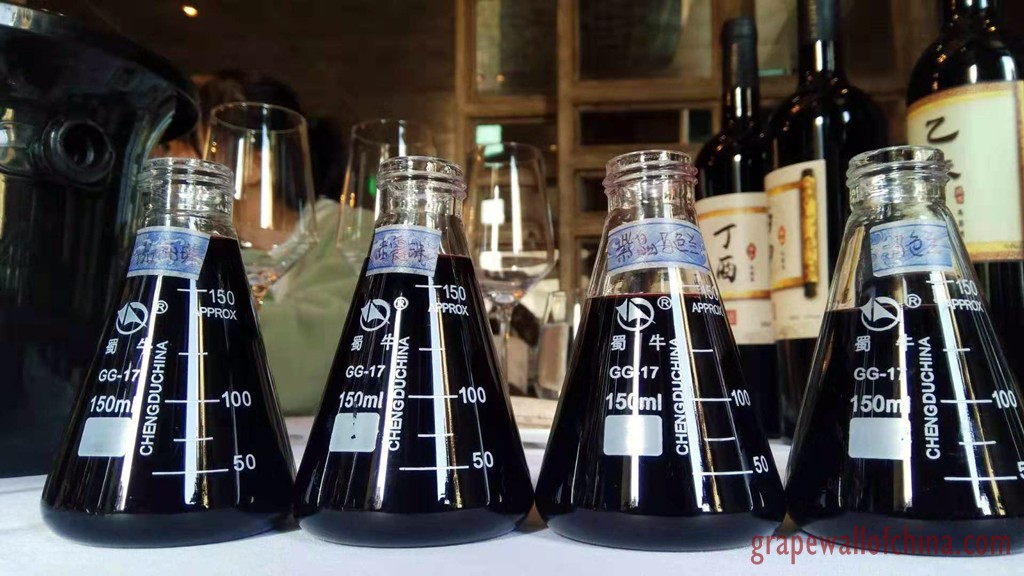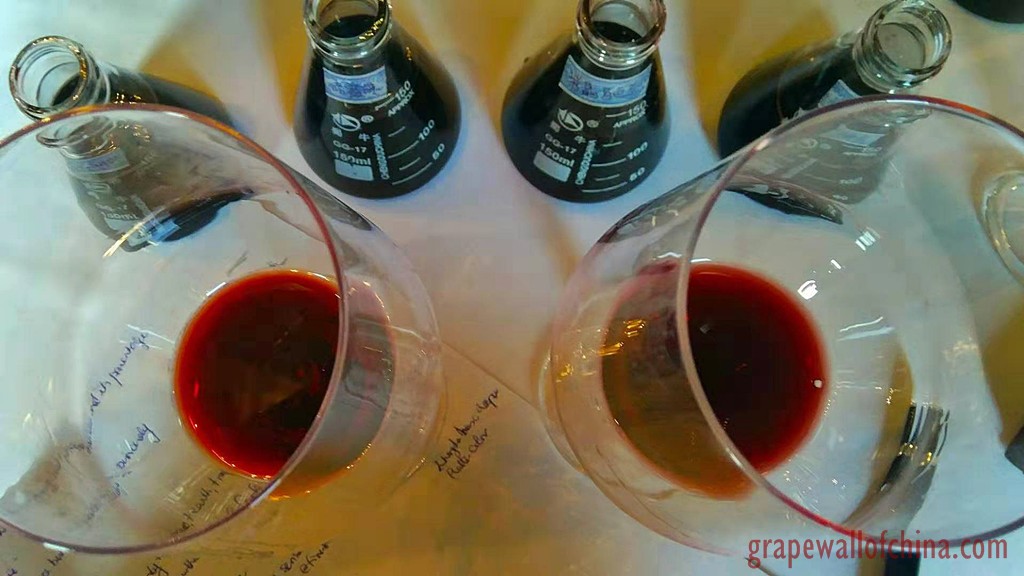Last October, I was lucky enough to make my own Marselan-based wine. And also fortunate to finally taste that blend during our World Marselan Day (ä¸æ–‡) events last week.

I didn’t go to a winery, or some blending facility, to make mine. I went to the Italian restaurant Tavola in Beijing. (Nice pizza.)
Tong Lili, owner of Marselan-focused Excelsis in Shandong, awaited a dozen-plus amateur winemakers at Tavola with beakers of wines from Huailai County, just outside Beijing — Marselans from the wineries Domaine Franco-Chinois and Amethyst plus Cabernet Sauvignon and Cabernet Franc. Our task was to use the wines to make our own special blend and then see how it fared against everyone else.

Our event was just one of ten Tong held around China as market research, including Foshan, Nanning, Beijing (six tastings), Shanghai and Hangzhou. She gave us a primer at the start–talking about Marselan and her desire to create an “everyday wine”–with clarity, sincerity and enthusiasm.

Then we got down to blending. Even on their own, the wines in each of the beakers was tasty, and I especially liked the Cabernet Franc.

All of my blends were heavily on the Marselan side. A typical example: 60 percent Marselan One, 10 percent Marselan Two, 20 percent Cab Sauvigon and 10 percent Cab Franc.
I made eight blends, making notes for each–“very tight with bursting fruit but too tannic”, “flatter, denser, big mouth feel but very dry”–before getting a mix I figured worth at least 110 points. (But nowhere near one million.)

After we submitted our wines, Tong shooed us out of the room to arrange the blind tasting contest. We enjoyed some snacks from Tavola and then headed back in to try everyone’s wines, one by one, and pick our three favorites. We wrote our three picks on our palms and then, on the count of three, everyone opened clenched fists to reveal the winners.

This event helped form the basis for a wine called 戊戌 — the names of Tong’s wines are linked to Chinese calendar cycles — with production of 1300 bottles.

And I finally tried the resulting wine, last Sunday, at two World Marselan Day tastings I helped organized in Beijing. We tasted it beside one of Tong’s wines from Penglai in Shandong and what a contrast.

While the Penglai wine was floral, soft and delicate, the Huailai sibling was fruitier, bigger — a bit rambunctious! — but I still liked it.
According to Tong, this Huailai wine is still “young” and “needs at least one more year in bottle,” which means we best try it again for World Marselan Day 2021!
Here’s the rest of Tong’s tasting note: “Attractive flowers and dark plum on the nose, complex fruit fruit flavors, such as blackberry, prune, and damson [plum]. Matured in French and Hungarian once-used barrels for nine months to give the wine good structure and a slight vanilla note.”
And a highlight of our World Marselan Day fun!
Note: Tong is co-founder, managing partner and chief winemaker of Excelsis, a Penglai-based wine company with six hectares of Marselan. She has done 10-plus years of viticulture research and study in Australia, Europe and Asia and previously led a wine import-export company. Her goal is to see Marselan become China’s signature grape and her project researches how it performs in different parts of the country, particularly Penglai in Shandong province and Huailai in Hebei province. She made her first wine, “Sheng Ying Jia Niang”, in Penglai in 2016, a blend of 85% Marselan, 10% Cabernet Sauvignon and 5% Petite Verdot, aged in new American, Hungarian and French barrels.

Grape Wall has no sponsors of advertisers: if you find the content and projects like World Marselan Day worthwhile, please help cover the costs via PayPal, WeChat or Alipay.
Sign up for the free Grape Wall newsletter here. Follow Grape Wall on LinkedIn, Instagram, Facebook and Twitter. And contact Grape Wall via grapewallofchina (at) gmail.com.

Leave a Reply
You must be logged in to post a comment.